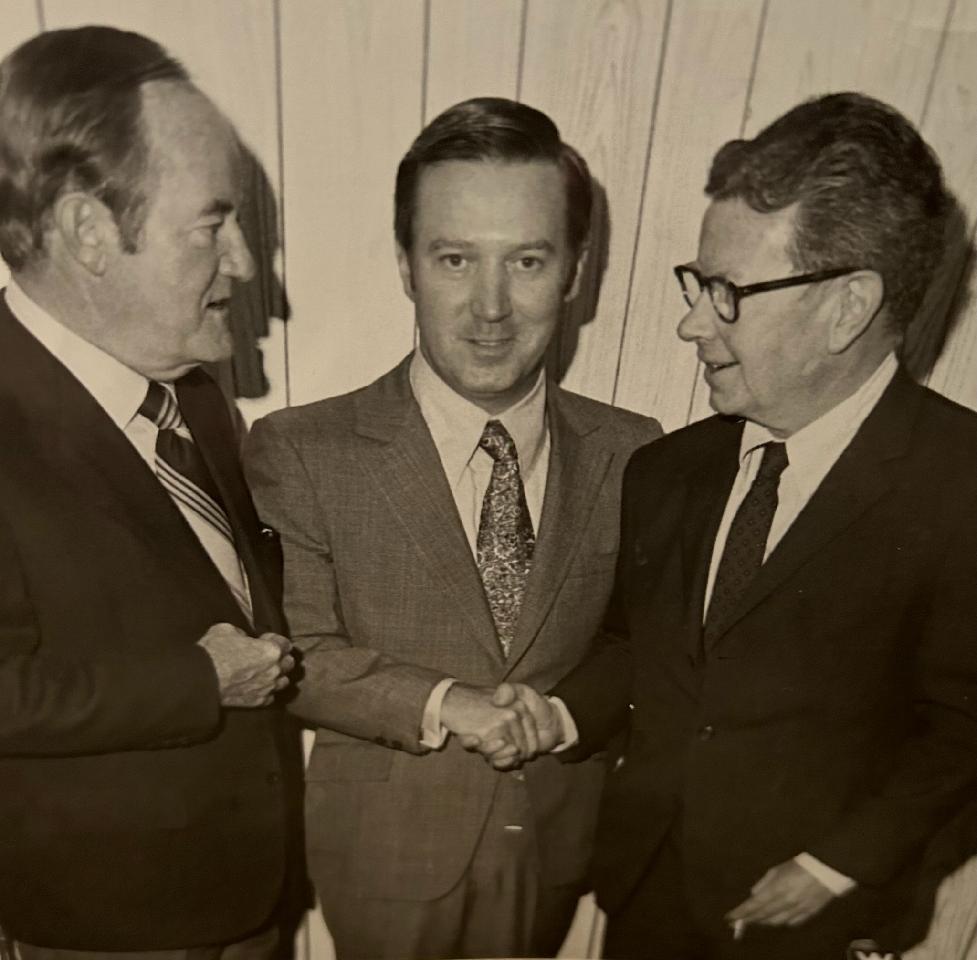
When evaluating modern journalists, I often express annoyance at their failure to cite historical antecedents for contemporary situations. The current journalistic attention to the “Politics of Joy” theme of the Kamala Harris-Tim Walz Democratic presidential ticket is a quintessential example of that.
The inventor of the concept, “Politics of Joy” was former Vice President and US Senator Hubert Horatio Humphrey. He coined this phrase in his speech announcing his candidacy for the Democratic presidential nomination on April 27, 1968 in the following context:
And here we are, just as we ought to be, here we are, the people, here we are the spirit of dedication, here we are the way politics ought to be in America, the politics of happiness, politics of purpose, politics of joy; and that’s the way it’s going to be, all the way, too, from here on out.
I have yet to hear one single national political journalist, network or cable, credit Hubert Humphrey with the authorship of the concept and phrase, Politics of Joy. The ignorance of history by our contemporary celebrity television journalists is appalling.
In the tumultuous, tragic year of 1968 in American politics, Humphrey would win the Democratic presidential nomination and come within a hair’s breadth of defeating Richard Nixon for the presidency. He would have defeated Nixon had he selected New Jersey Governor Dick Hughes as his running mate, as I have asserted in a previous column.
Humphrey and Hughes were very close friends and firm political allies. The relationship was not just one of mutual self-interests and beliefs. Hughes was an enthusiastic practitioner of the Humphrey Politics of Joy. My late close friend, former Governor Jim Florio described Dick Hughes upon his death in 1992 as having “practiced the politics of joy but also of determined hard work to bring about change.”
The Dick Hughes brand of the Politics of Joy was typified by his gregarious nature and his delightful penchant for storytelling. Indeed, he and his wife, the late beloved New Jersey First Lady, Betty Hughes were co-practitioners of the Politics of Joy. Above all, the Dick Hughes brand of the Politics of Joy featured a profound emphasis on Civility. In fact, the definitive biography of Dick Hughes, authored by Seton Hall Professor of Law John Wefing is entitled, The Life and Times of Richard J. Hughes: The Politics of Civility.
The Dick Hughes style of the Politics of Joy is best described by his son, former Morris County Prosecutor Michael Murphy. Michael told me how Dick Hughes was wont to say, “I can get more done inviting Republicans to meet me at Lorenzo’s (the former famed Trenton restaurant) than I can by just meeting with people at the State House.”
Humphrey’s heartfelt connection with New Jersey Democrats did not end with the election of 1968. In 1976, there was a movement among New Jersey Democrats, led by State Senator and Democratic State Committee Chair Jim Dugan, supported by Hubert’s wife, Muriel, to persuade him to challenge Jimmy Carter in the Jersey Democratic presidential primary. Humphrey, facing terminal cancer, declined.
I learned from highly reliable sources on Sunday, August 4 that Kamala Harris would select Tim Walz over Josh Shapiro as her Democratic vice-presidential nominee, basically due to an NDA issue involving Josh’s former chief of staff. I will write more about this in a subsequent column.
I then stated my immediate concern on Facebook and Twitter: Who is Minnesotan Tim Walz: Fellow late Minnesotan Democratic Senator Eugene McCarthy or Fellow late Minnesotan Democratic Senator Hubert Humphrey?
McCarthy was a most competent US Senator and towering historic figure, whose anti-Vietnam War candidacy in the 1968 Democratic primaries led to the decision of LBJ to not seek reelection. He was a man of unimpeachable ethics, character, and integrity. Unfortunately, he had a dour personality, which foreclosed any possibility of running successfully after 1968 for either the presidency or US Senate. As Theodore H. White said of McCarthy in 1968 in his book, The Making of the President 1968, “All through the year, one’s admiration of the man grew – and one’s affection lessened.”
By contrast, Hubert Humphrey was a much beloved US Senator. This was vital to his success in being the leading Congressional figure in the enactment of both Medicare and the Civil Rights Act of 1964.
I received the answer to my Minnesota question on Monday morning, August 5, when current US Senator from Minnesota Democrat Amy Klobuchar stated that Tim Walz was a practitioner of the Politics of Joy. She never acknowledged Hubert Humphrey, however, as the author of the Politics of Joy. I was indeed delighted that I could infer that Tim Walz is a Humphrey-style Minnesota Democrat, rather than Eugene McCarthy. Yet I was annoyed that Amy never mentioned Hubert.
It would be helpful if the Democrats started mentioning Hubert Humphrey’s authorship of the Politics of Joy. The contrast between the Humphrey Politics of Joy and the Donald Trump concept of the Politics of Darkness, Paranoia, Racial and Gender Grievance, and Institutional Mistrust could not be more vivid. The election of Kamala Harris and Tim Walz in 2024 will be another vindication of the greatness of Hubert Humphrey, just as was his enactment of Medicare and the Civil Rights Act of 1964.
Alan J. Steinberg of Highland Park served as regional administrator of Region 2 EPA during the administration of former President George W. Bush and as executive director of the New Jersey Meadowlands Commission. He graduated from Northwestern University and the University of Wisconsin Law School.
(Visited 14 times, 14 visits today)
Former Governor Dick Hughes was a key figure in the implementation of the Harris-Walz “Politics of Joy,” a political philosophy created by Hubert Humphrey. This philosophy emphasized the importance of positivity, collaboration, and inclusivity in politics, aiming to create a more harmonious and effective government.
Dick Hughes, who served as governor of a Midwestern state for two terms, was known for his ability to bring people together and find common ground on contentious issues. He was a strong advocate for bipartisanship and believed that by working together, politicians could achieve better outcomes for their constituents.
One of the key principles of the Politics of Joy was the idea that politics should be about more than just winning elections or passing legislation. It should also be about building relationships, fostering trust, and finding joy in the process of governing. Hughes embodied this philosophy in his approach to leadership, often reaching across party lines to find solutions that benefited all.
Under Hughes’ leadership, the state saw significant progress in areas such as education, healthcare, and infrastructure. His ability to work with lawmakers from both parties and engage with the public in a positive and inclusive manner helped to build consensus and move the state forward.
The legacy of Dick Hughes and the Politics of Joy continues to influence politicians and policymakers today. By focusing on collaboration, positivity, and inclusivity, leaders can create a more effective and harmonious government that serves the needs of all citizens. As we navigate the challenges of the modern political landscape, the example set by Hughes serves as a reminder of the power of joy in politics.



